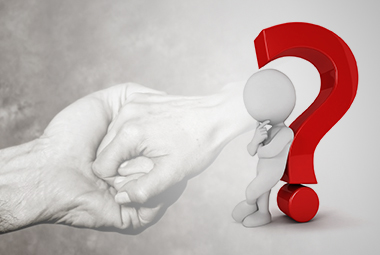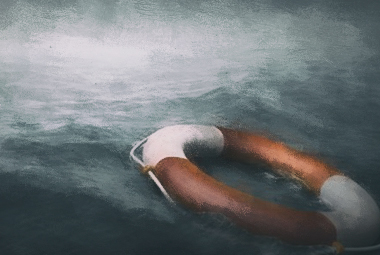Would You Risk All for an Unsure Return?

I really don’t know how to open with this one other than to say I was asked to write an article on the following piece on our sibling site, LCB.
I was asked to write an article about the above article, I don’t know if the request has to do with writing about the subject matter of the above article, my opinion of it, or both. I thought it would be more fun just to do both rather than seek out any specifics, so it looks like I am going to be giving everyone and perhaps ownership a look into my psychology.
This is something of a hypothetical that I think everyone has discussed at some point, whether it be a casual conversation with a high school classmate (at the time) or perhaps even a higher-level Philosophical debate proper, the question is under what circumstances and in what conditions would you save a life or more than one life?
The piece above-linked is worth reading on its own and is among the more well-studied and well put together that I have seen amongst such pieces, so might I recommend going ahead and reading all of that first as I am essentially going to get straight into the nitty-gritty. I’m only going to outlay the scenarios in very limited detail and explain what I think I would do and the reasons I think that?
Why the stress on think, Brandon James?
The answer to that is because I believe the specific responses in the sorts of situations that will be proposed are unknowable, at least, until one is actually, in fact, presented with the situation. When we discuss the fight, flight or freeze mechanism, I know that I am a quick decision-maker in a high pressure situation, but generally, not an instant decision-maker. My initial hesitation before choosing a course of action (and the choice will almost always be fight, the hesitation is just to decide how) could, admittedly, cost a life one day. Fortunately for me, I have not really been put into too many situations (only one that I recall) in which someone’s life actually potentially relied on my reaction time.
The first thing that we are going to do is look at a simpler version of the pie graphs in the above-linked piece, for my article, I am just going to use a generic table. Sorry. My lack of technical skill is reprehensible, but it seems unfair for the publisher to have to spruce up my presentation due to my own failings:
What we will have in this chart is first varying situations and then whether one would risk one’s life in dealing with that situation to save a woman, (for free) to save a man (for free), to save either with financial reward, or to not save them at all.
| Scenario | Save Woman Free | Save Man Free | Save Woman Reward | Save Man Reward | Do Not Save Woman | Do Not Save Man | Total Save Woman | Total Save Man |
|---|---|---|---|---|---|---|---|---|
| Sinking Car | 56% | 51% | 34% | 38% | 10% | 11% | 90% | 89% |
| Attack (No Gun) | 60% | 50% | 32% | 39% | 8% | 11% | 92% | 89% |
| Gunpoint | 37% | 31% | 39% | 43% | 24% | 27% | 76% | 74% |
| Burning Car | 61% | 59% | 31% | 32% | 8% | 9% | 92% | 91% |
The findings show that, depending on the situation, an individual is meaningfully more likely to attempt to save the woman for free. The mean difference in percentage between saving a woman free and attempting to save a man for free is 5.75%, so that seems to be a fairly meaningful difference.
Many of our heroes for free (when it comes to women) seem to be willing to attempt to save a man if they think there will be some prospect of a reward. This becomes evident when we look at the percentage of, “Do Not Save,” for each gender in which men will receive absolutely no help a mean percentage of 2% less of the time according to the respondents. In other words, about 3.75% of the respondents (on average) would not save a man for free in certain situations, but would be willing to do it with some hope of reward.

Unsurprisingly, the total percentage of people that would be saved, according to the respondents’ claims, seems to differ somewhat depending on the situation. In terms of the means, we have: Sinking Car-89.5% (overall), Unarmed Attack-90.5%, Gunpoint-75% and Burning Car-91.5%.
While a meaningful number of people would go in front of a gun for some promise of financial reward, it becomes pretty clear that going in front of a gun is the least desired of the options. That should comes as no surprise because even though the gender mean is 75% of the respondents helping someone being held at gunpoint (yeah, friggin’ right) it would be a situation that presents immediate physical danger and one from which one cannot immediately extricate oneself.
If we look at the case of a burning car, this might represent, perhaps, the easiest situation from which one can, ‘Abort Mission,’ so to speak. If the flames get too hot, or the breathing too difficult, this situation is one that people might perceive as being somewhat easy to abandon in time to preserve one’s own life, if necessary. People also have some degree of control in an unarmed attack, not to the extent that it is an easy situation from which to extricate oneself, but because many of the respondents probably imagine they could overpower the attacker with the other person’s help. Just don’t take that for granted in a domestic violence type situation, when someone tries to intervene there, it is not unusual for the partner against whom the violence was committed to defend the other partner! Either way, the respondents likely perceive that as a situation from which, even if they couldn’t extract themselves, they would not anticipate having their life at risk.
Finally, we’ll take a look at the sinking car. This might be considered, at least by a few, to be a more difficult situation to extract oneself than from a burning car because the individual might somehow get trapped under water. Also, maybe some of the respondents are quite learned and understand that a drowning victim’s response is often to use the would-be rescuer (at least in effect if not in intent) to try to pull themselves above the crest of the water thereby exposing the rescuer to the potential for drowning, as well.
My Answers
The first thing that I want to say is that I don’t think money would make a difference in my actions in any situation, though gender might. Furthermore, it’s really tough to give a firm answer when it comes to the gender of the person, but I will do my best to give, ‘Overall,’ yes/no answers while explaining my specifics. The reason that cash doesn’t matter is that the base article, strangely enough, does not mention the dollar value of the reward.

I would attempt to save either a man or woman from a sinking car, for free, (I think), but I would do a very poor job of it and would likely end up abandoning the mission in failure. The reason for this is not cowardice, but rather, self-preservation. The fact of the matter is that I am not a terribly good swimmer, and while I would do my best, due to my poor aquatic skills, in most situations, I would likely have to abort the mission before I could do anything effective. I certainly hope that I would extract the person from the vehicle, I would give it everything I had, but I simply don’t think I would be effective enough to save the person in most instances.
Protecting someone from an attack is the only one, I think, in which gender matters. I would be more likely to protect a woman, in general, and would likely protect any woman from a man. I would protect one woman from another woman if the attacking woman was clearly physically superior to the woman being attacked. (i.e. if the woman being attacked was greatly outmatched) I would likely not protect a man being attacked by another man if they both seemed to be of relatively equal strength, though I would probably do that for money if I knew the man doing the attacking was absolutely in the wrong in terms of whatever was going on. Although, that would really be more of a, ‘Break it up,’ sort of goal than me actually protecting the other guy. The physically weaker the man, the more likely I am to try to protect him. I would protect a significantly physically overmatched man without a second thought, and without pay.
Gunpoint, sorry, I’ve got kids. It doesn’t matter who you are or what you are paying me. You might need me, but so do my kids.
I think I would attempt to save anyone from a burning car without a second thought. Fortunately for the would-be victim, I would be much more effective in this capacity than in trying to save someone from a sinking car. I would not require any compensation, and the victim could be any gender, in the back of my mind, I know I could bail.
Now, we are going to look at some life-threatening events and who we would try to save:
These life-saving events aren’t much different from one another, so here they are:
- Dog Attack
- Drowning
- Oncoming Traffic
People would save their own kid for free 95-96% of the time regardless of the situation, would require financial compensation for saving their own child (just typing that turned my stomach a little) 4% of the time in all cases and would not save at all 1% of the time.

People would save someone else’s child for free 78-79% of the time, would require payment 17-18-and-19% of the time in the order drowning, traffic, dog and would not save at all 3-4% of the time with drowning at 4%.
People would save a spouse for free 94-95% of the time, would require payment (who are these people!?) 4% of the time and would do nothing 1% of the time.
Unsurprisingly, people care about their own family members, regardless of age, more frequently than they care about a child unrelated (presumably) to them.
In my particular case, I would attempt to save any of the people mentioned from any of those situations. I would attempt to save any of those people for free. I’ll also take it a step further and say I would probably attempt to save anyone at all from a dog attack or drowning, (despite my poor swimming ability) but oncoming traffic would be situational when it comes to an adult with my likelihood varying upon my perceived odds of survival.
Men are about 2% more likely than women, per respondents, to require cash to save a spouse in any of those situations. Who is paying them for this, hypothetically?
The next one involves attempting to rescue a child from a zoo enclosure with respondents being divided by gender and then asked about their own child v. a child that is, presumably, not related to them. Here is a table to see how that went:
| Own Child Woman Free | Own Child Woman Pay | Someone Else’s Woman Free | Someone Else’s Woman Pay |
Would Not Save Own Woman |
Would Not Save Someone Else’s Woman |
| 95% | 3% | 2% | 66% | 23% | 10% |
| Own Child Man Free | Own Child Man Pay | Someone Else’s Man Free | Someone Else’s Man Pay |
Would Not Save Own Man |
Would Not Save Someone Else’s Man |
| 94% | 5% | 1% | 63% | 29% | 7% |
Once again, regardless of whether it is one’s own child or someone else’s, women tend to be more theoretically heroic for men for free. However, this is one case where the prospect of making money has enough appeal for men that they would be more heroic, overall.
The one thing that I notice is that slightly fewer people are willing to do this for free, or at all, compared to the dog, traffic and drowning scenarios. I would attempt to save a child no matter the situation, but I immediately understand, I think, why slightly fewer people are keen on attempting a rescue here:
If we look at the situations alone, I think that people have often had an experience in which they were cornered by a dog, came somewhat close to drowning, or had a near losing physical encounter with an automobile. In other words, there is some point of reference here. Furthermore, in hypothetical person-to-person discussions, the traffic and drowning ones (if not so much the dog) seem to be fairly common examples, so I think that even those without experience have some sort of theoretical frame of reference and have already formulated some kind of hypothetical plan of action.
When we look at the zoo enclosure, particularly without knowing what sort of animal might be involved, I think an effect we may be seeing here is one of unsurety due to the fact that we’ve not even had the opportunity to meaningfully prepare a theoretical course of action. As a result, whatever confidence (or lack thereof) we may have had in our abilities for a given situation, it is replaced by nothing other than the unknown. One might ask oneself: How do I jump fifty feet into a tiger enclosure (for example) and then how do I go about either trying to aide the child in an escape, or alternatively, KILL A DAMN TIGER!
In my case, I am almost 100% positive I would try to make a rescue, but damned if I know how I would accomplish that. The, “Almost,” is because I am not 100% sure I’d try to save someone else’s kid...it would really depend on the specific situation. (Jump distance and animal(s) involved)
The page linked in the beginning of this piece then goes on to discuss how one claims one would behave based upon political leanings...and I’m not touching that with a thirty-foot pole. In addition to being contentious, it could possibly spark vitriol in the comments, and furthermore, it would be hypocritical of me. As everyone knows, I often lament the very existence of most of our political threads on the forums, so I’m not bringing it up, here.
The above-linked piece then looks at three different situations and compares Millennials, Gen-Xers and Baby Boomers with respect to what they claim they would do in three different situations: Child in a Zoo Enclosure, Woman from a Burning Car, Man at Gunpoint, and looks at who is least likely to risk their lives.
When it comes to a child in a zoo enclosure, the range is from 7-9% and is not statistically significant. When it comes to a woman from a burning car, 12% of Baby Boomers would not attempt to save her compared to 8% of the other two groups. I suspect this probably has more to do with the physical limitations of respondents than their level of bravery.

Interestingly, but perhaps not surprisingly, younger people seem far less likely to step in front of a person at gunpoint (or fight the gunman) than their older counterparts. The results:
- Millennials: 33%
- Generation X: 27%
- Baby Boomers: 25%
I hardly consider the data surprising, Millennials have, “Just begun to live,” so to speak, so regardless of their youth and physical abilities (generally speaking) it should come as no surprise that they would avoid the most dangerous situation. While not statistically significant, the main thing that surprises me (mildly, limited sample size) is how close Gen X’ers and Baby Boomers are in this regard. I believe I fall between Millennial and Gen X, (some definitions seem to consider me one and some the other!) but I’ve got two kids, both under ten, and I don’t think I am going to risk what I consider almost certain death.
I am not The Negotiator, I’ll leave that for Kevin Spacey, he’s a Baby Boomer.
The study is pretty fascinating, and while not statistically significant when there are only differences of a couple percentage points, (2,000 total respondents) there are definitely some clear trends in the bigger numbers, how much knowledge we have of situations, how close the victims are to us and with the level of perceived danger.
While I don’t necessarily question the honesty of people in answering for their own children or other family members, I do wonder how many of these crazy-brave people have given this any serious thought when it comes to the children of others, or even moreso, unrelated adults. I think that we often like to think that we are more brave than we actually are, and other than very few respondents, I also believe that all of these responses are largely hypothetical.
I maintain that we don’t really know what we are going to do until we are actually presented with the situation in question, and in the above cases, let’s hope that these theoretical situations remain just that: theoretical!



